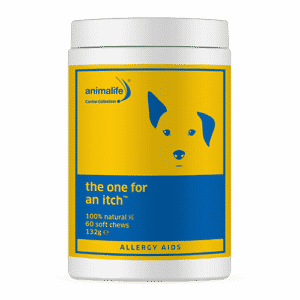Dog Health
What’s That Itch?
Nothing’s more irritating than an itch – and that applies to your dog as much as you. Itching is common in dogs, but there are many possible causes, so how can you diagnose and treat the issue? Every dog will have a good scratch now and then, but when the behaviour becomes excessive, it’s a sign there is a problem to investigate. The medical term for scratching related to excessive itching is pruritus and signs include:
- Incessant and repeated licking
- Biting, nibbling and chewing of the coat
- Scratching with such intent that the dog wounds itself
So what can the causes be?
Allergies
A common cause of itching in dogs, allergies can be triggered by a range of factors and as such are tricky to diagnose. Some dogs are allergic to environmental pollutants, such as pollen or dust, while other allergies are caused by diet, such as processed dog foods and dairy. Your vet will need to run tests, but the definitive cause of an allergy can be hard to diagnose and often involves eliminating and reintroducing potential causes from the diet and environment. As with anything, prevention is better than cure. Supporting your dog’s immune system is key in the fight against allergies, as is probiotic support. Research has shown that a healthy gut with a diversity of bacteria reduces the likelihood of a dog developing allergies in the first place.
Top tip! Support your dog from the inside out with the one for an itch and the one for a happy tummy . Use these chews in combination to boost skin health and gut flora.
Parasites
Fleas, ticks and mites cause compulsive itching and scratching and a great deal of irritation. If you walk your dog in a tick hotspot (for example, where deer graze) be sure to check them over after every walk. Ticks are visible and can be removed with tweezers or a tick key, but mites and particularly fleas can be much harder to spot. Don’t assume that your dog isn’t suffering from parasites just because you are unable to see them. A flea control regime is essential and there are lots of options out there, both prescription and non-prescription. Your vet will be able to advise.
Ear infections
Repeated pawing and scratching at the ears and head, alongside rubbing the ears along the ground, are usually signs of an ear infection. Ear infections are incredibly painful and left untreated can cause long-term damage, including hearing loss. All breeds of dogs can be affected – in fact it is estimated that 20% of dogs suffer from ear health issues – but those with long, heavy ears, such as Spaniels and Basset Hounds, are particularly at risk. If you suspect your dog has an ear infection, or a foreign body in their ear (such as a grass seed), seek immediate veterinary attention. But remember there is a lot you can do to maintain healthy ears, such as regular cleaning (at least once a week) with a treatment such as the one for clean, fresh ears. By flushing out the ear canal the risk of infection is reduced, plus wax is kept at a normal and healthy level. If your dog is a keen swimmer, be sure to wash their ears after every swim.
What’s scooting?
There’s a very particular type of itch that most owners are familiar with – the scoot. Scooting is when a dog rubs their bottom along the floor. It may also be accompanied by nibbling at the area around the bottom. Scooting is seen in all breeds and both sexes. Scooting is caused by anal gland issues, either an infection or the glands becoming full and needing to be emptied. The anal glands are situated either side of the anus and secrete a fatty substance that is essential in helping dogs communicate with each other. Over time, these glands become full or even infected, which means a trip to the vet. Modern dog foods contain a lot of cereal filler, which softens stools and makes it more difficult for the glands to empty naturally. Help your dog and reduce scooting by supplementing with the one for an itchy bottom , which helps reduce inflammation of the anal glands.



